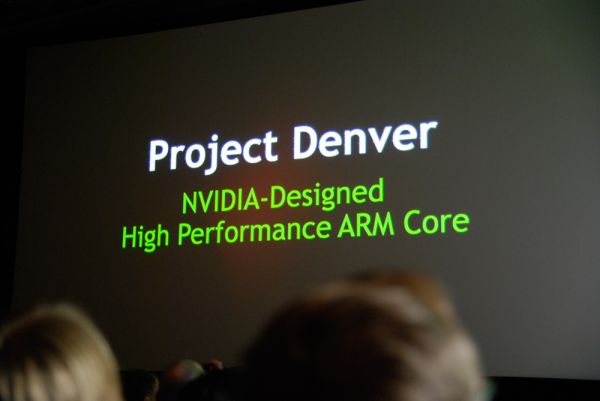NVIDIA's Project Denver: NV Designed, High Performance ARM Core: Updated!
by Brian Klug on January 5, 2011 4:00 PM EST- Posted in
- Smartphones
- Arm
- Project Denver
- Mobile
- SoCs
- NVIDIA
NVIDIA's CEO, Jen-Hsun Huang just announced Project Denver - its first CPU architecture design ever, based on ARM's ISA. This is a custom design done by NVIDIA in conjunction with ARM and targeted at the high performance computing (HPC) market.
This is a huge announcement from NVIDIA, but not entirely unexpected. Prior to Project Denver NVIDIA licensed ARM IP but developed its own IP everywhere else for use in Tegra. Going forward, NVIDIA is turning into a full fledged SoC architecture company. This is a huge step in NVIDIA becoming a major player in the SoC evolution going forward.
Update: NVIDIA provided some more details on the announcement. Project Denver is targeted at everything from PCs to HPC/servers. This is completely a high end play going after the x86 stronghold. Project Denver ties in completely with Microsoft's announcement to bring Windows 8 to ARM next year.
NVIDIA also announced that it will be licensing ARM's Cortex A15 core, presumably for use in lower end devices (e.g. smartphones). I wouldn't be surprised if NVIDIA eventually moves to its own architecture based on ARM across the board.











47 Comments
View All Comments
SoulSlave - Thursday, January 6, 2011 - link
Hummmmm....This sounds like PowerPC all over Again...
dertechie - Thursday, January 6, 2011 - link
ARM is very efficient at 1 GHz. We know this. The thing is, to run something bigger than a low-end notebook, it needs more a lot more processing power than that. My question is, when you scale the ARM design up to 2-3 GHz to compete core-for-core with modern Bulldozer/SNB cores, does it STAY power efficient? To run at 3 GHz, you probably need two things: more voltage and a more complex core. You simply aren't going to go 3 GHz on <1V, not on current process technologies. More complex cores are bigger, bigger cores take more power even if you do power gate very well.ARM has architectural advantages, but I don't think they're going to be as pronounced when you scale up from 1 GHz Snapdragons to desktop and server chips. Especially desktop, servers can run on parallelism, clients have more of a demand for a few fast threads.
ac2 - Friday, January 7, 2011 - link
Good question, but does it need to?ARM seems well suited for the mobile world where cost and power are more important and there is no established software/ platform monopoly like WinTel to dethrone. Definitely a good case there.
For performance desktops/ laptops the case seems a bit weak, both due to the higher clocks as per your point above and the WinTel x86 domination. The only exception being Apple who will do whatever they damn well please. For regular enterprise servers the same (possibly) holds true.
However on the HPC side there are already specialised 8-way ARM servers in place. These may be a minority right now but their cost/ power - performance make them viable. And once again there isn't an establised software/ platform monopoly so that helps. Examples
- http://www.theregister.co.uk/2010/11/02/dell_dcs_a...
- http://www.theregister.co.uk/2010/08/25/arm_server...
- http://www.theregister.co.uk/2010/11/23/zt_systems...
jconan - Friday, January 7, 2011 - link
Hopefully Amiga will also be one of the companies to port their old OS over to ARM. There'll be a lot more CPU suppliers to choose from for advanced ARM processors in the near future as well as open source parts.NightStalker_ra - Friday, January 7, 2011 - link
this is not the first time that MS has ported /reworked windows to run on non x86 when the Alpha was still the best CPU ( damn you comcrap and intel ) windows NT ran on it and was supported till Compaq bought Digital and killed the CPU.IMO MS will drive the push for the ARM market ( anyone remember that intel has been working on its OS ) and please no flames i am not a MS fanboy i do use windows for gaming but i use easypeasy for my laptop and 3 other Linux distros on my desktop. And if you read any of the tech tear-downs on the new 360 you can see that it is headed in the same general direction.So if MS can get the same apps to run on the 360/PC/Windows phone and android
with out the pain of porting or recompiling why wouldn't they ?
Resistance is futile you will be assimilated
just the thoughts of some dude
BigDDesign - Saturday, January 8, 2011 - link
If Windows could serve an operating system with only what was needed coming out of OEMs. Everything else would be turned off. Or just offer many choices of Windows OS. Each would offer certain capabilities. I remember Windows 95 with Raid 0. It just was so fast. Sorry Microsoft, but recompiling a group of new Windows operating systems that cater to speed and need seem to be the way to stay competitive. I'm sorry, but Windows is still the way to compute. Just make multiple operating systems that cater to hardware or use. We used to hear about a streamlined OS from Microsoft for speed, but we have yet to see it. Just a thought.shriganesh - Tuesday, March 1, 2011 - link
I think x86 is pretty saturated too! Hope it kills intel! And I hope AMD jumps into ARM bandwagon or it's Fusion APUs kicks ARM's british a**